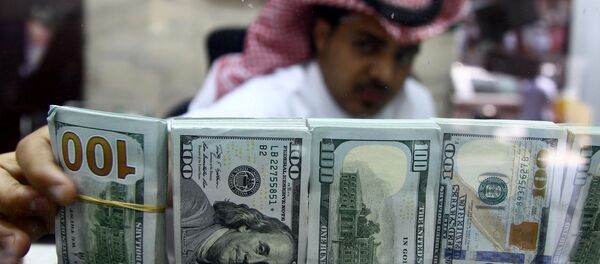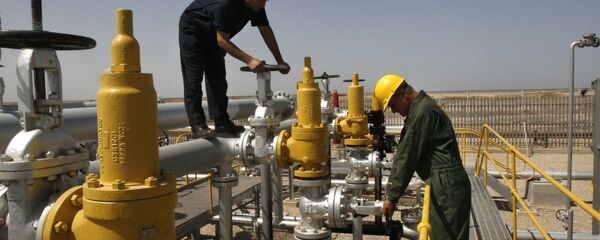With Saudi Arabia and other members of the cartel struggling to balance their budgets due to lower oil revenues, OPEC decided to completely reverse its November 2014 decision not to impose a cut in oil output despite plummeting oil prices amid a glut of shale oil.
The price of oil rose by 5.9 percent on the day OPEC's agreement was made public, and continued to increase the following day, by another 1.1 percent. However, on Friday it declined by 0.4 percent, with the price of Brent crude settling at $49.06 per barrel.
Konstantin Simonov, director of Russia's National Energy Security Fund, told Vzglyad that OPEC's announcement is hard to believe, given that the cartel has not kept its word after announcing previous agreements.
"I don't really believe OPEC. They have broken their quotas so many times. OPEC members are extremely undisciplined, and there is a complicated relationship between Iran and Saudi Arabia."
"Some Sheikh might say that this is just a Filkin Charter. Or the Arabs could say that they are fulfilling the agreements but actually they are just continuing to produce as before. They have already accustomed us to the fact that this is not a serious organization, but some kind of racket which does not take responsibility for what it says," Simonov said.
Simonov declared that announcements about cutting production are actually irrelevant to the market, which is driven by the behavior of market speculators.
"Let's be honest, the influence production factors have on (oil) prices is greatly exaggerated. Production volumes are not the main thing in the formation of the price of oil. The main thing is the exchange rate of the US dollar, and the position of speculators who either throw money at the futures market, or close their position," he said.
"US production fell, but less than expected. The Chinese economy is growing more slowly than last year, which forms oil demand. That is to say, all the negative factors remained, but oil prices rose 50 percent."
"Everybody explained that [in terms of] expectations of an agreement in Doha. But the Doha meeting was a failure and prices were supposed to collapse, but that didn't happen. Now the joke starts – they said prices are rising because of a strike in Kuwait. But the strike ended after a few days. After that, some really obvious fibs – fires in Alberta and so on. Yes, there were fires, but to say that there were two million barrels less on the market is just a joke. They finished a long time ago and prices are still floating at around $45-$50 per barrel."
"That's why the desire of producers on its own is no enough. The main thing is the position of speculators. The question is, what kind of game do they want to play – are they going to bet on a fall or a rise in prices," Simonov said.
While OPEC exerted a strong influence over oil prices in the 1970s, the volatility of markets has made the cartel irrelevant. In order to regain some lost influence, Simonov said that OPEC should dissolve and form a new organization, as some hoped would happen after the April Doha meeting of 18 oil-producing countries, including Russia.
"OPEC is living off former glory. It would be a great story if OPEC-2 had been formed in Doha. That story would be a good verbal intervention. We could easily stretch out a few years (of higher prices) on that PR. But they ruined that idea, and they have not been able to agree anything within the OPEC framework for a long time. And they will soon realize that themselves," Simonov said.
Amid a collapse in oil prices in November 2014, due to the flood of shale oil production capacity which was put in place in the US and other countries, OPEC made the historic decision to allow the market to balance oil supply and demand, in the hope of forcing shale oil producers in the US and elsewhere to stop operations due to lower profits.
However, according to a report by energy consultancy group Wood Mackenzie, US shale companies have been able to cut prices by as much as 40 percent since 2014, by driving harder bargains with equipment suppliers and oilfield service firms, and more efficient prospecting.
"The history of all OPEC deals is that the amount of so-called cheating that goes on is enormous. So, one shouldn't overrate any (agreement)," he told Radio Sputnik.
Saudi Arabia has already said that three OPEC members, Iran, Libya and Nigeria, will be exempt from the deal, since they have not been pumping at full capacity due to sanctions, civil war and terror attacks respectively.
OPEC's announced cut in output, to between 32.5 million and 33 million barrels per day, amounts to a reduction of less than one million barrels: In August OPEC produced 33.327 million barrels per day and 33.24 million in July, when Nigeria suffered Boko Haram militants' attacks on its oil infrastructure.
"Even if they did come down to some specific arrangements when we get to the November 30 meeting, the next job for everyone to do is (to tackle the fact that) everybody still seems to be cheating. So the point is, it (this agreement) puts a floor under oil prices but it doesn't necessarily mean that we can have a sustained rally from where we are currently," Ostwald said.





